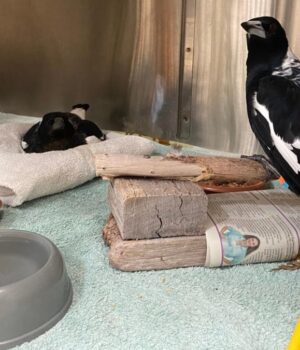Source : Perth Now news
Wildlife carers across the State have been inundated with an alarming numbers of birds suffering from an unknown disease causing paralysis.
Researchers from Murdoch University are collaborating with wildlife carers across the region to find a diagnosis to the epidemic, which has flared up across Perth and the South West.
Murdoch University Harry Butler Institute’s Bethany Jackson said impacted birds are showing symptoms such as weakness, inability to stand or coordinate movements — and in more advanced cases, an inability to lift their heads or breathe.
The researchers are collaborating with wildlife centres and organisations, such as Wildlife Health Australia, to gather information on the geographic range, species and age of animals affected along with conducting tests to find a diagnosis.
WA magpies have presented with similar signs since 2018, but with the number of cases exponentially growing along with the areas affected, it is vital to identify the root cause of the condition.
“In the past, some birds were diagnosed with botulism, however, there are some parts of this that do not fit with a typical botulism event,” Dr Jackson said.
“Although preliminary investigations have been conducted, and some potential causes examined, more information is needed before a specific cause can be determined.”
Dunsborough Wildlife Carer Chloe Field has seen a “horrific” increase in the number of birds needing care since late last year.
“This summer, they’ve just started turning up in droves,” she said.
Ms Field said in once instance she took in 11 diseased magpies in under 48 hours and a fellow carer has taken in more than 100 affected birds since the start of the year.
“It has been wiping out entire families of magpies, it’s just awful,” she said.
Dr Jackson said they are working at every level to try and get some clues as to what is happening.
“We look forward to diagnosing the cause of this syndrome and being able to share that information with wildlife carers, veterinarians and the public,” she said.
Dr Jackson said the work was made possible by support of the many volunteers who care for affected birds, the organisations that support them, and the government agencies and Wildlife Health Australia who supported the research.
Researchers are urging the public who see a sick magpie to avoid contact with the bird,” Dr Jackson said.
“Instead contact a wildlife rehabilitation group or a veterinarian. Record what you see, including the location of the animal and take photos or video if safe to do so.”


